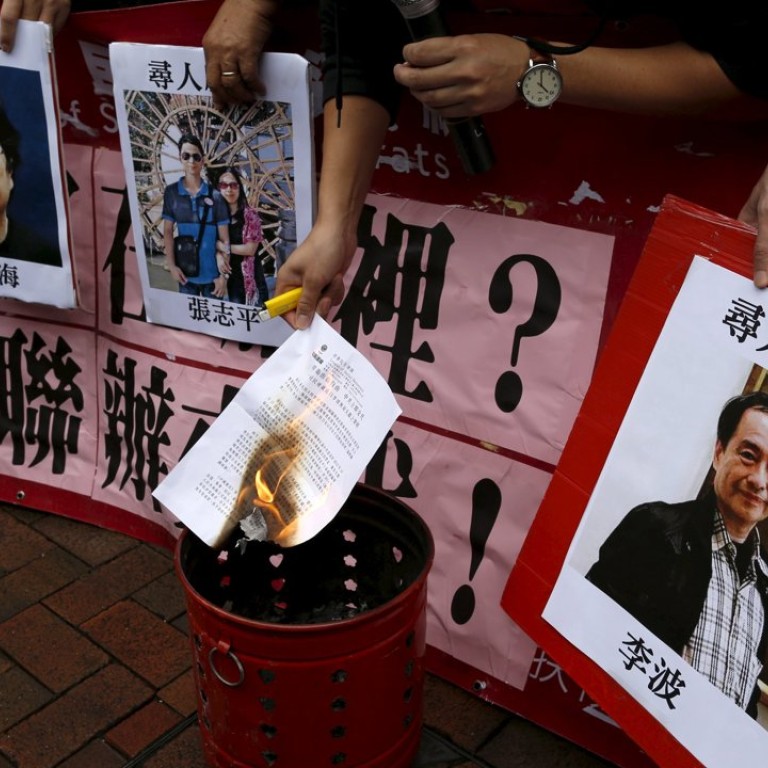
Letters to the editor, January 18, 2016
Hong Kong freedoms under threat
I agree that the Basic Law is the foundation of “one country, two systems” and all parties, regardless of their political stance and background, need to give it their full respect.
Hong Kong’s freedoms, including its press freedom, are under attack, as can be seen in recent events. In 2014, the Umbrella Movement erupted in Hong Kong when many Hong Kong people, including many university students, were no longer content to be “keyboard warriors” and decided to directly fight for democracy.
Meanwhile, the Hong Kong government is obedient to the commands of the central government and does not listen to its people. Hence, it is losing its legitimacy.
The case of the five missing booksellers has only added to the unease. Most people believe they have been detained by mainland authorities over their publication of books critical of Beijing. Yet, over the past weeks, some of them have “come forward” to offer other reasons for their “disappearance”. The whole episode has confused many people.
Although I do not know the truth of the matter, I am afraid we would lose our freedoms one day. I understand why more and more people are standing up to fight for democracy.
It is time to make our voices known, or, once our freedoms are lost, we would live to regret it.
Susie Yip, Kwai Chung
Free to speak – but only if one agrees with it
“The unconditional exercise of free speech often ends up involving innocent lives,” he wrote.
Mainland officials may not be crazies but what are they if not fanatical about suppressing criticism of the Communist Party? Certainly, we do not know if mainland security services were connected to these disappearances. However, if the Chinese government detains illegally its own citizens in “black jails”, why should we think that it will let the Basic Law stand in its way of abductions in Hong Kong? Hence, can’t we say that Causeway Bay Books’ associates knew what they were getting into and, by Mr Lo’s logic, have only themselves to blame?
One might argue that the Charlie Hebdo cartoons were juvenile and obscene while the books published by the missing booksellers were serious. For the record, the sociologists Jean-François Mignot and Céline Goffette found that between 2005 and 2015, only 7 per cent of the 523 Charlie Hebdo cover cartoons targeted religion and just over 1 per cent targeted Islam in particular. Hence, the magazine was never “gunning” for radical Islam when its cartoonists were gunned down.
If you condone attacks on people whose controversial speech you condemn, be not surprised when other aggressors target controversial speech you condone.
Gregory W. Whitten, Tuen Mun
Forced apology was shameful
I think the actions of the mainland Chinese people who criticised the flag-waving and pressured her agency into issuing the apology were unforgivable. We should respect people who come from different countries and regions.
Taiwan and mainland China have been grappling with the nationality issue for many years with no solution. The Chinese do not have the power to claim a Taiwanese person is a Chinese citizen.
The Chinese should not have pressured Chou’s agency with their threat to boycott the entertainers represented by that agency.
In a peaceful world, we should respect different peoples, and the more powerful among us should not threaten others just because they can.
Karina Kwok, Tseung Kwan O
Street sleepers deserve more help
As we all know, Hong Kong has some of the world’s most expensive property. Although prices have fallen a little in recent months, many people here still cannot afford decent housing, and there continues to be some poor people who have to sleep in the rough or find shelter in 24-hour McDonald’s outlets.
The government must initiate more policies to help them. Homeless people or those who live in tiny subdivided flats endure poor hygiene conditions and are highly exposed to theft and other safety risks.
Society as a whole, too, would benefit if homeless people could be properly housed.
The government should provide more financial support to these people. In particular, officials should apologise to the street sleepers who lost their belongings in the government raid and offer them compensation.
Mable Shing, Tsuen Wan
A development plan from the last century
How very “second millennium” that the government’s initiative revolves around its default setting – that is, the pouring of millions of tonnes of concrete. Can’t we acknowledge that we are now living in the 21st century and thus build a city for the majority, not just the fat-cat families and their cronies who milk the place at every possible opportunity?
Jason Ali, Lantau

